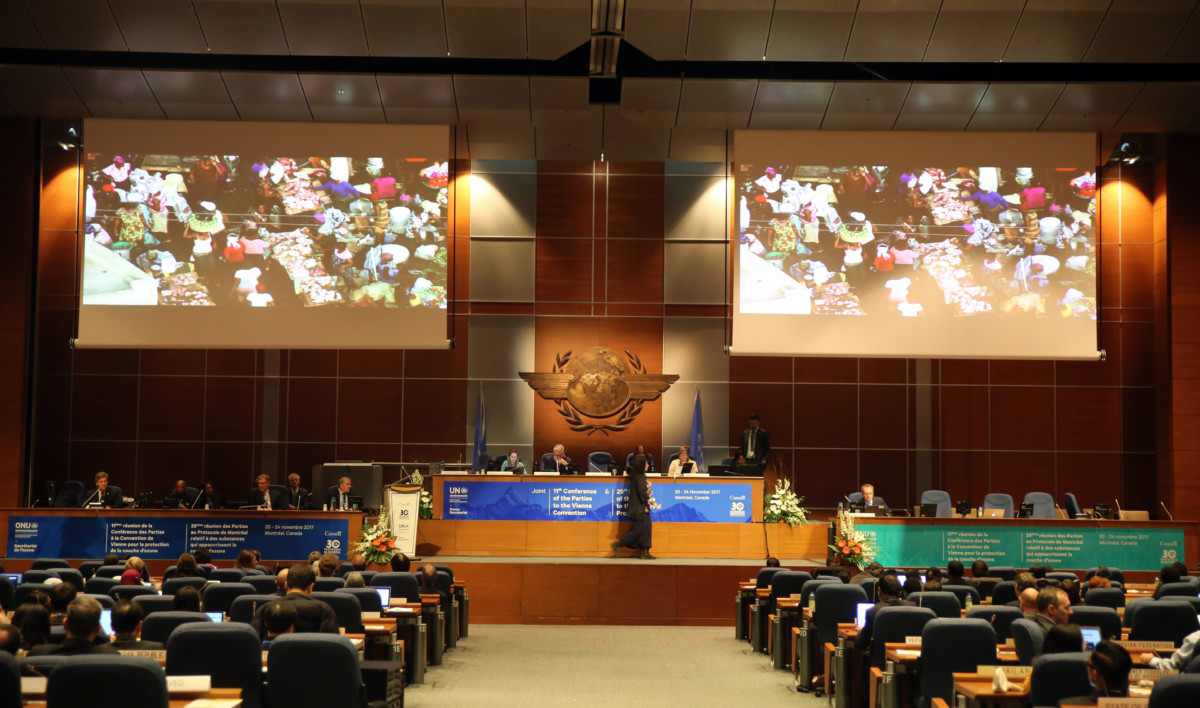Montreal Protocol Concludes 30th Anniversary with Robust Financial Replenishment, Progress on Energy Efficiency

Montreal, Canada, 25 November 2017 — Early this morning at the conclusion of the 30th anniversary Meeting of the Parties (MOP) of the Montreal Protocol the Parties agreed to a robust three-year replenishment of $540 million to fund the continuing phase out of HCFCs, and to a separate decision to have the Technology & Economic Assessment Panel study how best to integrate energy efficiency with the HFC phasedown under the Kigali Amendment.
The energy efficiency decision was submitted by India, Bahrain, Kuwait, Lebanon, Saudi Arabia, and the African Group. It recognizes the importance of maintaining and enhancing energy efficiency during the switch from high-global warming potential HFCs to low-GWP alternatives in the refrigeration, air conditioning, and heat pump sectors. This has the potential to avoid significant CO2 emissions from the power plants that provide the electricity to run these products and equipment, estimated by Lawrence Berkeley Laboratory to equal the production from of up to nearly 1,600 medium-sized (500 MW) peak-load power plants by 2030, and up to 2,500 power plants by 2050.
In addition, UN Environment Executive Director Erik Solheim launched a Global Clean Cooling Campaign to support Montreal Protocol Parties to include energy efficiency while phasing down HFCs. This important effort is funded by the Kigali Cooling Efficiency Program (K-CEP), a philanthropic fund of $52 million dedicated to catalyzing energy efficiency in the cooling sector. K-CEP announced the Campaign via twitter: “Erik Solheim launches package in support of Montreal Protocol work on #Cooling #efficiency to avoid up to 1°C. http://bit.ly/2hV4Xxa @UNEP #MOP29 #KigaliAmendment”.
“That 1°C of avoided warming may be the most significant contribution the world could make to the goal of the 2015 Paris Agreement, to keep the increase in average world temperatures to well below 2°C, aiming for 1.5°C above their pre-industrial level,” said Durwood Zaelke, President of the Institute for Governance & Sustainable Development.
The U.S. continued its support of the Montreal Protocol, a treaty that started under President Ronald Reagan and Prime Minister Margaret Thatcher. U.S. head of delegation Judith G. Garber, U.S Principal Deputy Assistant Secretary of the Bureau of Oceans and International Environmental and Scientific Affairs, stated:
“The United States views the Montreal Protocol as of one of the world’s most successful multilateral environmental agreements. When he signed the Montreal Protocol, President Reagan said, and I quote: “The Montreal Protocol is a model of cooperation. It is a product of the recognition and international consensus that ozone depletion is a global problem, both in terms of its causes and its effects. The Protocol is the result of an extraordinary process of scientific study, negotiations among representatives of the business and environmental communities, and international diplomacy. It is a monumental achievement.” It is to the credit of everyone in this room that this statement is as true today as it was 30 years ago…
The United States believes the Kigali Amendment represents a pragmatic and balanced approach to phasing down the production and consumption of HFCs, and therefore we support the goals and approach of the Amendment.
There are a number of steps in our domestic process that we would need to complete before reaching a final decision on the transmittal of the Kigali Amendment to the U.S. Senate for its advice and consent.
There is no timeline currently determined for these steps, but we have initiated the process to consider U.S. ratification of the Amendment.
We have enjoyed working with all of you for the past 30 years and look forward to continuing our cooperation. We have much work ahead of us, but we can rely on a strong foundation built by decades of Ozone Heroes. We can, and will, continue that incredible legacy.”
In the run-up to this year’s meeting on 17th November 2017, Sweden became the 20th Party to deposit its instrument of ratification to the Kigali Amendment, which ensures that the amendment will enter into force 1 January 2019. The amendment will eliminate warming from HFCs —one of the six main greenhouse gases. Many other Parties are poised to complete their own ratification shortly.
While exhausted after a long week and a longer night, Parties were proud to conclude the 30th Anniversary of what is widely considered the world’s most successful treaty, which is continuing to deliver for the Earth. This time, agreements on financing, energy efficiency, and having 20 Parties announce the ratification of the Kigali Amendment, send the strongest signals possible to the markets, and the best climate news for the world.
An Op-Ed by Nobel Laureate Mario Molina & Durwood Zaelke, The Montreal Protocol: Triumph by Treaty, is here.
Former Canadian Prime Minister Brian Mulroney’s opening speech is here.
IGSD’s HFC Primer is here.